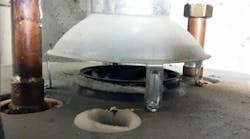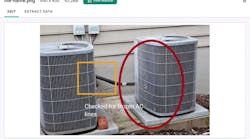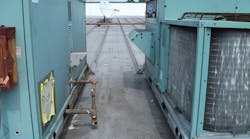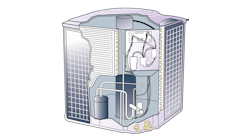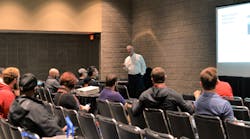A string of bad luck last summer, followed by some helpful information, opened my eyes to capacitor quality issues, and what everyone needs to know about them. I'm a Southern California HVAC residential and commercial service contractor. As a routine part of my service, I take readings on capacitors and replace any that are failed or weak.
Over the years, I've experienced occasional problems with capacitors failing within a year or so of installation. I thought that by switching suppliers and brands, I would eliminate the problem. My business did its best to provide a quality part to my customers, but I never knew of a way to measure the quality of a particular brand of capacitor. It was kind of hit and miss.
In the summer of 2010, I had a large preventive maintenance project that entailed servicing three or four buildings that had about 80 units each. The service included taking readings on all the capacitors and replacing the faulty ones, which amounted to about 180 compressor-sized capacitors and 125 smaller ones.
Within a couple months, I began to receive reports that the capacitors that had just been replaced were failing. When I pulled the capacitors out from the units, every one of them was bad or weak. They were brands I had used before and had purchased from a reputable supply house, so it really frustrated me. I contacted the supplier and the manufacturer about the problem right away. In the meantime, while waiting for their response, I proceeded to replace the capacitors again, using a different brand of capacitor, so much of the materials and all the labor costs were on me and my business.
In an effort to protect my customer's equipment, I had installed parts that I believed were of high quality. Instead, those parts had jeopardized their equipment, along with my reputation. As you can imagine, it doesn't look good to complete a preventive maintenance assignment, only to be called back because of a system failure. This leaves the customer to rethink their conclusions about your work.
Right about that time, I read an article written by Anthony Colone of Genteq, which talked about investing in quality capacitors. This article opened my eyes. Here was someone was speaking to the industry about special standards and ratings for capacitor quality set by the Electronic Industries Association (EIA). According to Colone, the reliability test outlined in EIA-456 is a Highly Accelerated Life Test (HALT) in which a set of capacitors is subjected to 125% of their rated voltage, and 10C above their rated temperature for 2,000 hours. EIA-456 calls for a first-year failure rate of no more than 0.50%.
Until I read the article, all I could do was test the new capacitors before they were installed, which I always did. But, as I learned from Colone, every capacitor tests the same out of the box, regardless of whether they're made in the U.S. or overseas. Only the manufacturers' HALT test data will prove the longevity and reliability of a capacitor. This was the first time I had been shown a way to determine which caps were good quality and which were not. It's very important for contractors to know the standards set for capacitors, so they can ask for test data from their suppliers.
I don't advertise, and my business has been built solely on the confidence and trust my customers have in me. I need to make money, and continue to look for ways to cut costs, if possible. But, if cost cutting means having a product that'll fail prematurely, then I don't want to use it. I can't afford to install bad parts — they make me look bad. Learning about HALT test ratings has given me peace of mind. Now, I don't have to put my trust in a supply house, because I know what information to look for. I have another project on a big building coming up, and expect to replace a lot of compressor and motor capacitors. Thanks to Genteq's research, I've done my homework and am confident that I'm using capacitors with a long field life.
Jim Parisi is owner/president, RE Air, Glendora, CA. He can be reached at 626/914-7069.
